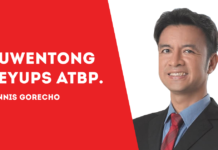
IN ALIMODIAN, Iloilo, the transformative power of the Alternative Learning System (ALS) is vividly illustrated through the stories of individuals like Lyn Mondero, Lyka Marie Baylosis, and Roda Andea Daan, reported by Panay News yesterday. These women, each with unique barriers that interrupted their early educational journeys, have found in ALS not just a second chance, but a reaffirmation of their right to learn and aspire, regardless of age or circumstance.
Education, a cornerstone of societal advancement and personal growth, has traditionally been tailored to the young, unfolding in classrooms bustling with youthful enthusiasm. Yet, not everyone walks this straightforward path. For many, life’s unpredictable turns necessitate a departure from education, often leaving dreams deferred and potentials unmet. The Department of Education’s ALS gives hope, redefining the educational landscape to include those who have veered off the traditional course.
ALS offers flexible learning schedules and tailored curricula, accommodating those who balance the dual demands of family and education, and providing a lifeline to those who thought their educational prospects were permanently dimmed. It stands out as a crucial corrective to the exclusions of traditional education systems. It actively reaches out to out-of-school youths and adults, offering them education at no cost. This democratizes access to education and also enhances social equity by ensuring that education is attainable for all, especially the historically marginalized. By doing so, ALS not only educates but empowers, fostering a sense of hope and resilience among its students.
However, the stories of success, as heartening as they are, also remind us of the work that remains to be done. The challenges of funding, resource allocation, and program reach continue to pose significant barriers to the expansion of ALS. More than logistical, these also emphasize the importance of recognizing and institutionalizing the idea that education should be universally accessible and adaptable to all life circumstances. This means not only maintaining but increasing funding, investing in the training of more capable facilitators, and expanding the program to reach every barangay.
Additionally, public awareness campaigns are crucial to inform potential students of their opportunities, effectively ensuring that those who can benefit from such programs are aware of and can access them.
As we champion the cause of non-traditional students, we must also advocate for policies that recognize and accommodate the diverse trajectories of learners’ lives. Education systems need to be as flexible and varied as the populations they serve. In promoting and expanding ALS, we do not merely provide a backdoor to education; we open a gateway to empowered individuals and, consequently, stronger communities.
In an era where education is more important than ever for personal and national development, programs like ALS are essential. They are the vehicles through which we can fulfill the promise of education for all, ensuring that every individual has the opportunity to contribute to and benefit from our society’s progress.



